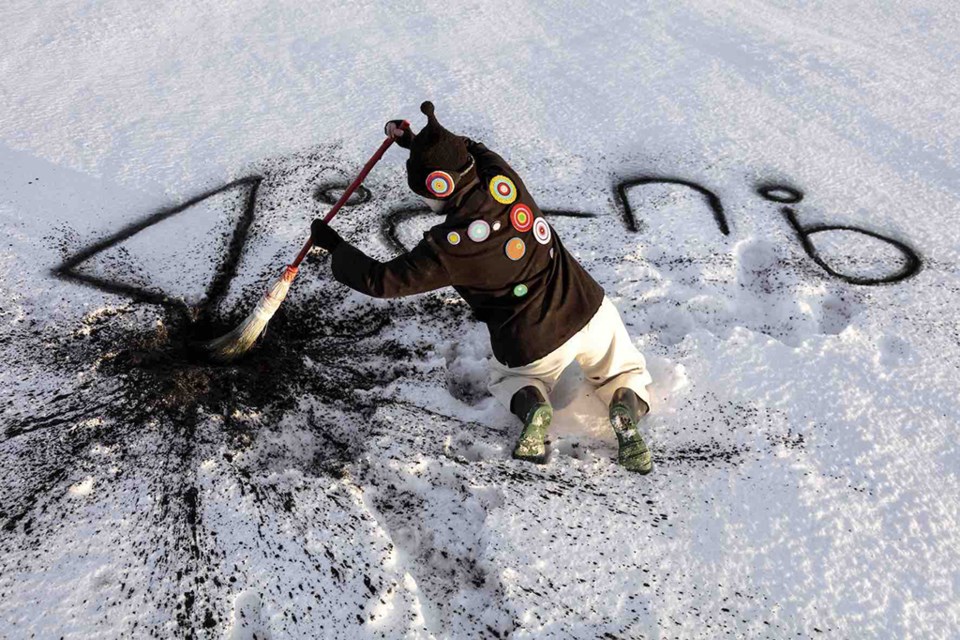SASKATOON — Staying connected to her history, ancestry and culture is something Meryl McMaster has always worked on both as an award-winning Canadian photographer and in her personal life. But now, in her newest body of work, nôhkominak âcimowina or Stories of My Grandmothers, which includes nine photographs, and for the first time, two short films, the artist with ties to Red Pheasant First Nation is killing two birds with one stone.
McMaster's new collection of work on exhibition at the Remai Modern until Dec. 31, 2023, is inspired by the lives and stories of her paternal grandmothers Bella Wuttunee, Matilda, and Lena, spanning 130 years in the Red Pheasant community.
“I was inspired by personal belongings of theirs that my family came into possession of once my grandmother passed away,” Meryl McMaster told guests at an off-site event on July 20 at the Chief Poundmaker Museum and Gallery coinciding with Miyawata Culture's annual Indigenous performance festival and a sneak-peek of the Bloodlines exhibition that opened to the public at the Remai Modern on July 21.
She added that simple moments were captured in her great-grandmother's diary ranging from farming, hauling wood, caring for sick children, or baking bread while interviews with great aunts and uncles, and recounted family stories ranging from seeing King George VI to flattening pennies on train tracks inform the direction of nôhkominak âcimowina.
“To me, it sounds a little bit like ... you have written a voice for your ancestors to speak to you. Which, to me, feels like a profound act of care. And sort of honouring their voices, but also kind of supporting yourself,” Tara Hogue, the co-curator for the exhibition said at the event after sharing a snippet of one of her newest films that was inspired by her great-grandmother’s relationship with trees.
Other stories that are highlighted in the series of nine photographs and two short films include one of her grandmothers (who was Battleford Industrial School student) possibly witnessing the mass hanging at Fort Battleford in 1885, her grandmother's connections with trains, or the sense of place Indigenous women have always sought.
"And so you see in that film, I'm kind of reenacting some of these anecdotes and stories and then perhaps stringing them together into this narrative," McMaster said.
“Indigenous peoples are made to feel invisible, and, you know, especially Indigenous women and our stories, and so I think working with my grandmother's words … I’m looking at the other stories of these women trying to kind of reverse that trajectory," McMaster said, adding that, "...they're kind of speaking through me.”
McMaster noted that nôhkominak âcimowina helps her to stay connected to her culture and family here in Saskatchewan while working and living in Quebec and that finding a sense of belonging is a long-term theme in her work. She added that her first-time foray into video is exciting as her prior photographs felt like still frames of a larger narrative or film that are now encapsulated in her new work.
"It [a sense of connection] is something that's been instilled in me as a young child as my parents would always travel back to Red Pheasant to Saskatchewan to visit family members because it was important for them for me to know where I came from," McMaster, told SASKTODAY.ca
"So before I was creating art, it was something that was instilled in me ... I've continued that process. And I think, again, it's just important for me as an individual and not just as an artist to continue to create that connection.
The photos and videos that form her new body of work are only a small part of the larger exhibition at the Remai Modern that stretches across all of her work, something the gallery calls a "survey exhibition of Meryl McMaster" whose photography reflects her heritage and Plains Cree, Metis, Dutch and British ancestry.
"This exhibition includes works from throughout her career and brings us up to date on her current explorations of family histories, in particular those of her Plains Cree female forebears from the Red Pheasant Cree Nation in present-day Saskatchewan," reads information on their website.
“I still can't believe that I have enough work to fill the whole gallery space,” McMaster told SASKTODAY.ca
“I am so proud and honoured to have this opportunity. And I don't take that for granted. And, yeah, I'm excited for where it's gonna go,” she said, noting that the travelling exhibition will travel to Hamilton, Calgary, Montreal, and other cities and museums across Canada.
McMaster also noted that she was excited to be taking part in an event on Poundmaker First Nation before the official opening on July 21 in Saskatoon.
"Floyd [Favel] has been one of my mentors for a very long time. And I remember coming here for the very first Storytelling Festival several years ago. And, you know, I think it's just, even to come and share ... means a lot and just to be so close to family," she said.
Hogue also noted her appreciation for the Chief Poundmaker Museum and other stakeholders who helped make the exhibition a reality.
"Well, we've [The Remai Modern] been a fan of Meryl's work for a long time. And when the McMichael [Canadian Art Collection] approached us about this project, it was just such a great opportunity to be able to represent an artist whose practice is so connected to this place," she said, describing the travelling exhibit set to leave Saskatoon at the very end of 2023.
"And you know, how great is it that we can be able to tell a richer story about the place that the museum is located? ... I think while they connect very much to Meryl's personal, family and history, they have so many entry points into them and speak to, I think, really universal ideas about family and belonging, and lineage and place and all these different things that make us up as people."




